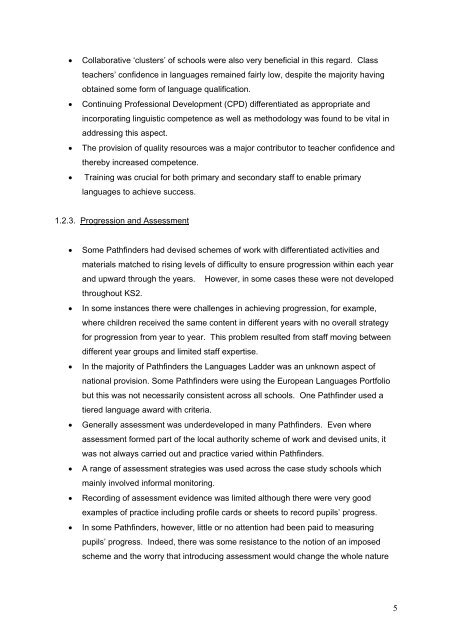Evaluation of the Key Stage 2 Language Learning Pathfinders
Evaluation of the Key Stage 2 Language Learning Pathfinders
Evaluation of the Key Stage 2 Language Learning Pathfinders
You also want an ePaper? Increase the reach of your titles
YUMPU automatically turns print PDFs into web optimized ePapers that Google loves.
• Collaborative ‘clusters’ <strong>of</strong> schools were also very beneficial in this regard. Classteachers’ confidence in languages remained fairly low, despite <strong>the</strong> majority havingobtained some form <strong>of</strong> language qualification.• Continuing Pr<strong>of</strong>essional Development (CPD) differentiated as appropriate andincorporating linguistic competence as well as methodology was found to be vital inaddressing this aspect.• The provision <strong>of</strong> quality resources was a major contributor to teacher confidence and<strong>the</strong>reby increased competence.• Training was crucial for both primary and secondary staff to enable primarylanguages to achieve success.1.2.3. Progression and Assessment• Some <strong>Pathfinders</strong> had devised schemes <strong>of</strong> work with differentiated activities andmaterials matched to rising levels <strong>of</strong> difficulty to ensure progression within each yearand upward through <strong>the</strong> years. However, in some cases <strong>the</strong>se were not developedthroughout KS2.• In some instances <strong>the</strong>re were challenges in achieving progression, for example,where children received <strong>the</strong> same content in different years with no overall strategyfor progression from year to year. This problem resulted from staff moving betweendifferent year groups and limited staff expertise.• In <strong>the</strong> majority <strong>of</strong> <strong>Pathfinders</strong> <strong>the</strong> <strong>Language</strong>s Ladder was an unknown aspect <strong>of</strong>national provision. Some <strong>Pathfinders</strong> were using <strong>the</strong> European <strong>Language</strong>s Portfoliobut this was not necessarily consistent across all schools. One Pathfinder used atiered language award with criteria.• Generally assessment was underdeveloped in many <strong>Pathfinders</strong>. Even whereassessment formed part <strong>of</strong> <strong>the</strong> local authority scheme <strong>of</strong> work and devised units, itwas not always carried out and practice varied within <strong>Pathfinders</strong>.• A range <strong>of</strong> assessment strategies was used across <strong>the</strong> case study schools whichmainly involved informal monitoring.• Recording <strong>of</strong> assessment evidence was limited although <strong>the</strong>re were very goodexamples <strong>of</strong> practice including pr<strong>of</strong>ile cards or sheets to record pupils’ progress.• In some <strong>Pathfinders</strong>, however, little or no attention had been paid to measuringpupils’ progress. Indeed, <strong>the</strong>re was some resistance to <strong>the</strong> notion <strong>of</strong> an imposedscheme and <strong>the</strong> worry that introducing assessment would change <strong>the</strong> whole nature5

















